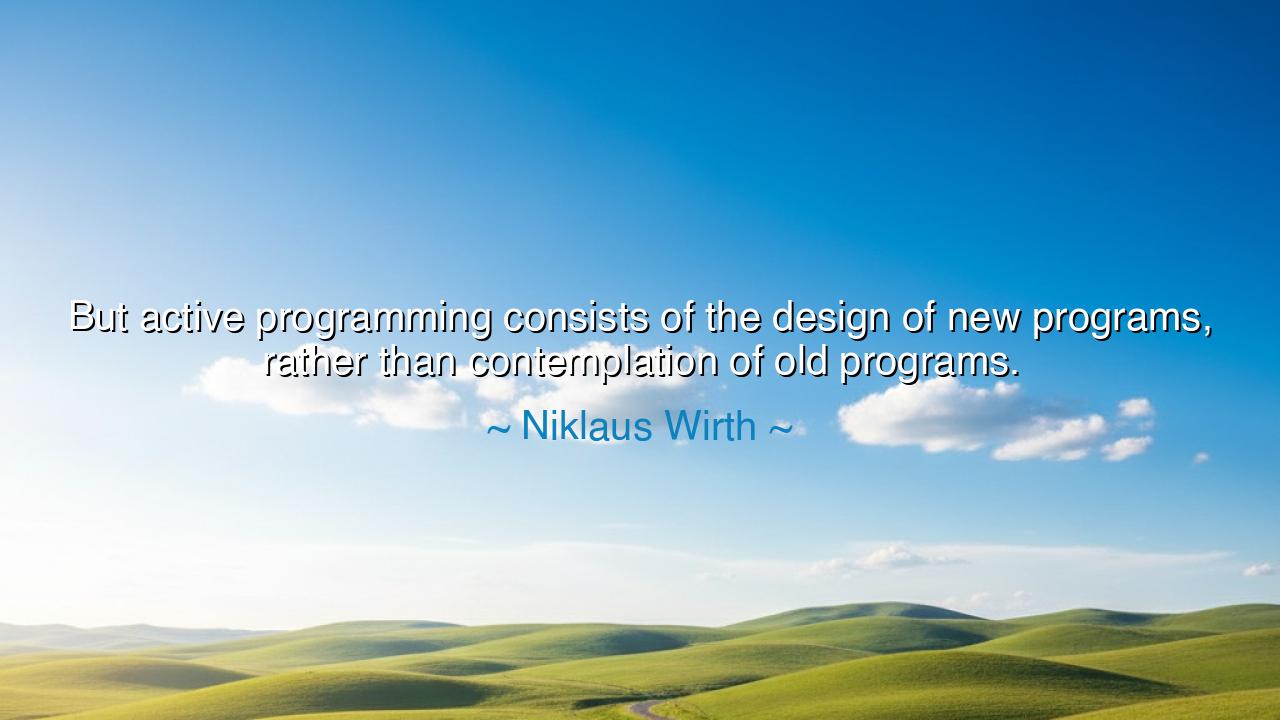
But active programming consists of the design of new programs
But active programming consists of the design of new programs, rather than contemplation of old programs.






The words of Niklaus Wirth — “But active programming consists of the design of new programs, rather than contemplation of old programs.” — speak with the voice of a craftsman, philosopher, and pioneer. Beneath this seemingly simple statement lies a profound truth about the nature of creation, not only in the realm of computing but in all human endeavor. Wirth, the father of the programming language Pascal, was a man who understood that the essence of progress lies not in revering what has already been built, but in daring to create anew. His words remind us that the vitality of a discipline — and indeed, of the human spirit — comes from its movement forward, from the restless impulse to design, to imagine, and to bring into being that which has never existed before.
In his time, Wirth stood at the dawn of the computer age, when programming was still young and full of mystery. Many programmers busied themselves studying the systems of others — dissecting old code, marveling at its logic, and treating it as sacred text. But Wirth, like the ancient inventors and mathematicians, urged his students toward active creation. To him, programming was not an act of worship but of construction; not the memorization of patterns, but the invention of new structures of thought. He believed that only through the design of new programs could the human mind remain alive and free. In this, his philosophy echoes the words of the ancients — for as the sculptor perfects his art by shaping new stone, so too does the programmer perfect his craft by shaping new logic.
The meaning of Wirth’s quote extends beyond machines and into the very fabric of life. For every generation faces the temptation to dwell upon the works of its predecessors — to contemplate old programs, whether they be the traditions of society, the theories of science, or the systems of art. Yet contemplation alone breeds stagnation. The wise must learn, as Wirth taught, that reverence without renewal leads to decay. The vitality of civilization depends on those who dare to write the next line of the world’s code, who take what was given and, through courage and imagination, transform it into something greater.
History offers us countless mirrors of this truth. Consider Leonardo da Vinci, who studied the anatomy of birds not to praise the perfection of nature, but to design the flying machines of the future. He, too, understood that knowledge without creation is lifeless — that the highest honor one can give to the past is to build upon it. Or think of Isaac Newton, who famously said, “If I have seen further, it is by standing on the shoulders of giants.” He did not simply admire those giants; he extended their vision through his own. Like Wirth, these figures remind us that contemplation is the soil — but creation is the fruit.
There is also a moral dimension to Wirth’s teaching. In every field, there are those who grow complacent — who take comfort in the old ways, who refine what already exists but never question its foundation. Such people, though learned, live in the shadow of the past. The truly active mind, however, is like the fire Prometheus stole from the gods — it burns with the courage to create, to risk imperfection for the sake of discovery. Wirth’s “active programming” is not simply technical; it is spiritual. It is the discipline of bringing forth new order from chaos, new meaning from silence.
And yet, this path is not without struggle. To design something new is to confront uncertainty, to fail again and again until the structure takes shape. Wirth himself faced resistance when he proposed simplicity over complexity in programming design. Many mocked his insistence that beauty lay in clarity, not in complication. But time vindicated him — for his philosophy of structured programming became the foundation of modern computing. His life teaches us that innovation is born not from imitation, but from persistence, from the refusal to be content with what is merely good enough.
So let this be the lesson to all who hear: Do not become a contemplator of old programs, content to walk the paths others have paved. Study them, yes — honor their wisdom — but do so as preparation for your own creation. Whether you are a builder of code, of art, or of life itself, remember that your purpose is not to admire what has been done, but to add to the ever-growing architecture of human endeavor. For it is in the design of new programs — in the fearless act of creation — that the spirit of humanity remains forever young, forever evolving, and forever free.






AAdministratorAdministrator
Welcome, honored guests. Please leave a comment, we will respond soon